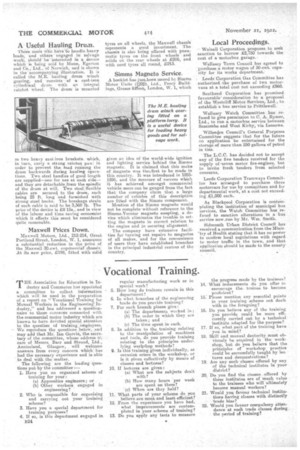Vocational Training.
Page 8

If you've noticed an error in this article please click here to report it so we can fix it.
91 HE Association for Education in In dustry and Commerce has appointed a committee to collect i4ormation which will be used in the preparation of a report on "Vocational 7 raining for Manual Workers in the Engineering' Industry," and has addressed a questionns.ire to those concern & connected with the commercial motor industry which are known to have devoted special attention to the question of traiming.eMployees. -We reproduce the questions below, and may add that Mr. Ian Genii,' the secretary of the committee, whose address care of Messrs. Barr and Stroud, Ltd., Anniesland, Glasgow, will welcome answers from every concern which has had the necessary experience and is able to deal with the matter.
The following are the leading questions put by the committee : 1. Have you an organized scheme of training for your (a) Apprentice engineers; or (h) Other workers engaged in engineering?
2. Who is responsible for organizing and carrying out your training scheme?
3. Have you is special department for training purposes?
4. If so, is this department. engaged in J324 regular manufacturing work or in special work? How long do trainees remain in this department! In whatbranches of the engineering trade do you provide training ? For each branch please give: (a) The departments worked in ; • (b) The older in which they are taken; and (c) The time spent in each.
In addition to the training relating to the manipulation of machines and tools, do you provide training relating to the principles underlying workshop methods?
Is this training given individually, as occasion arises in the workshop, or is it given collectively by means of classes and lectures?
If lectures are given: (a) What are the subjects dealt with?
(b) How many hours per week are spent on them?
.(e) When are they held?
What parts of your scheme do you believe are most and least, efficient? From the experience you have had, what improvements are contemplated in yonnscherne of training? Do you apply any tests to measure the progress made by the trainees? 14. What inducements do you. offer to encourage thetrainee to become proficient? 15. Please mention any essential points In your training scheme not dealt with in the foregoing?
16. Do you believe any of the training you provide could be more efficiently carried out by a technical institute adapted for the purpose? 17. If so, what part of the training have you in mind?
18. Skill and manual dexterity must obviously be acquired in the workshop, but do you believe that the principles of workshop practice could be successfully taught by lee. tures and demonstrations?
19. Are any such classes offered by any of the technical institutes in your district?
20. Do, you find the classes . offered by these institutes are of much value to the trainees who will ultimately become manual workers?
21. Would you favour technical institutions flaying classes with distinctly trade bias?
22. Would you favour compulsory attendance at such trade classes during.. the period of training?






























